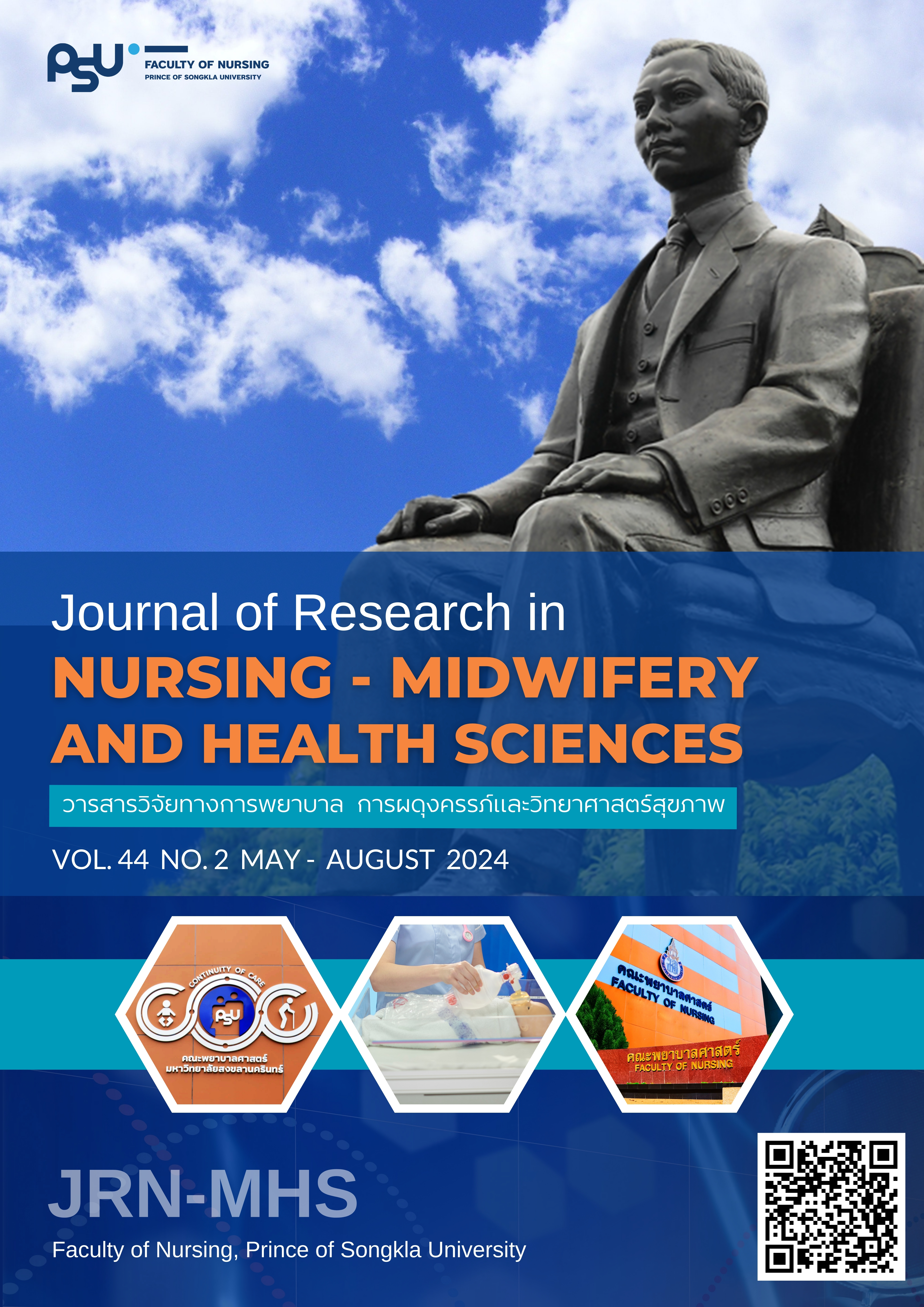การพัฒนาแนวปฏิบัติทางคลินิกสำหรับการพยาบาลผู้ป่วยจิตเวชที่ได้รับการรักษาด้วยไฟฟ้าแบบใช้ยาระงับความรู้สึก
Main Article Content
บทคัดย่อ
วัตถุประสงค์: การวิจัยเชิงพัฒนา มีวัตถุประสงค์เพื่อพัฒนาและประเมินความเป็นไปได้ ความพึงพอใจของพยาบาลในการนำแนวปฏิบัติทางคลินิกสำหรับการพยาบาลผู้ป่วยจิตเวชที่ได้รับการรักษาด้วยไฟฟ้าแบบใช้ยาระงับความรู้สึกไปใช้ วิธีการ: แนวปฏิบัตินี้พัฒนาขึ้นโดยใช้แนวคิดการพัฒนาแนวปฏิบัติทางคลินิกของสภาวิจัยทางการแพทย์และสุขภาพแห่งชาติออสเตรเลียร่วมกับการทบทวนวรรณกรรม และกระบวนการพยาบาล ประกอบด้วย 2 ระยะ คือ (1) พัฒนาแนวปฏิบัติทางคลินิกสำหรับการพยาบาล และ (2) ประเมินผลความเป็นไปได้และความพึงพอใจจากพยาบาลผู้ใช้แนวปฏิบัติฯ คุณภาพของแนวปฏิบัติฯ โดยผู้ทรงคุณวุฒิ 3 ท่าน กลุ่มตัวอย่าง คือ พยาบาลวิชาชีพที่ปฏิบัติงาน ณ หอผู้ป่วยจิตเวชโรงพยาบาลสงขลาราชครินทร์ จำนวน 32 คน วิเคราะห์ข้อมูลเชิงปริมาณด้วยสถิติพรรณนาและข้อมูลเชิงคุณภาพด้วยการวิเคราะห์เนื้อหา ผลการศึกษา: 1) แนวปฏิบัติฯ ประกอบด้วย ชื่อเรื่อง วัตถุประสงค์ กลุ่มเป้าหมาย ผังขั้นตอนการปฏิบัติ และสาระสำคัญของแนวปฏิบัติโดยใช้
กระบวนการพยาบาล 3 ระยะ ได้แก่ ระยะก่อนการรักษา ระยะระหว่างการรักษา และระยะหลังการรักษา 2) ความตรงเชิงเนื้อหาแนวปฏิบัติฯ ประเมินโดยผู้ทรงคุณวุฒิ 3 ท่าน มีค่าดัชนีความตรงของเนื้อหาเท่ากับ .97 3) ผลการประเมินคุณภาพแนวปฏิบัติฯ ด้วยแบบประเมิน AGREE II โดยผู้ทรงคุณวุฒิ 4 ท่าน และภาพรวมเท่ากับร้อยละ 95.63 และ 4) ความคิดเห็นความเป็นไปได้ในการนำใช้ระยะก่อน ระหว่างและหลังการรักษา คิดเป็น ร้อยละ 71.88-100, 93.75-100, และ 93.75-100 ตามลำดับ อีกทั้งพบว่ากลุ่มตัวอย่างมีความพึงพอใจในภาพรวมต่อการใช้แนวปฏิบัติฯ อยู่ในระดับมากที่สุด (M = 4.81, SD = .40) สรุป: แนวปฏิบัติทางคลินิกสำหรับการพยาบาลผู้ป่วยจิตเวชที่ได้รับการรักษาด้วยไฟฟ้าแบบใช้ยาระงับความรู้สึกที่พัฒนาขึ้นในการวิจัยครั้งนี้มีคุณภาพและมีความเป็นไปได้ในการนำไปใช้ ดังนั้นจึงควรมีการใช้แนวปฏิบัตินี้ในโรงพยาบาลจิตเวชที่มีการบำบัดผู้ป่วยด้วยไฟฟ้าแบบใช้ยาระงับความรู้สึก
Article Details

อนุญาตภายใต้เงื่อนไข Creative Commons Attribution-NonCommercial-NoDerivatives 4.0 International License.
เอกสารอ้างอิง
World Health Organization. world-mental-health-report [internet]. Geneva: World Health Organization; 2023 [cited 2023 May 16]. Available from: https://www.who.int/news-room/fact-sheets/detail/mental-health-strengthening-our-response.
Department of Mental Health. Report on services for psychiatric patients in Thailand, Department of Mental Health [internet]. Nonthaburi: Department of Mental Health; 2022 [cited 2023 May 16]. Available from: https://dmh.go.th/report/datacenter/dmh/reds.asp.
Medical records of Songkhla Rajanagarindra Psychiatric Hospital. Annual report of statistics of patients with psychiatric disorders. Songkhla; 2022. Thai.
Lortrakul M, Sukanich P. Psychiatry Ramathibodi. 4 th ed. Bangkok: Department of Psychiatry Faculty of Medicine Ramathibodi Hospital, Mahidol University; 2015. Thai.
Sihiranwong A, Yuttarai P, Kasamut P, et al. Psychiatric nurse. Nakhon Pathom: Printing Business Line; 2014. Thai.
Parinupap P, Panasathit M. Electroconvulsive Therapy in the Psychiatric Unit at Uttaradit Hospital: Retrospective descriptive
study (Chart Review). TMJ. 2018; 18(3): 300-9. Thai.
Electroconvulsive Therapy Service Unit of Songkhla Rajanagarindra Psychiatric Hospital. Annual report of statistics of psychiatric
disorders patients undergoing modified electroconvulsive therapy. Songkhla: Songkhla Rajanagarindra Psychiatric Hospital;
Thai.
Itthasakul P. Electroconvulsive therapy. Bangkok: Ramathibodi textbook project Faculty of Medicine Ramathibodi Hospital
Mahidol University; 2022. Thai.
Sakulpan S, Suwornarong K, Thanoi W. Situation of electroconvulsive therapy by use of anesthesia in psychiatric patients at the
Kanlayana Rajanagarindra Institute. JRTAN. 2018; 19(Suppl): 316-25. Thai.
Termphonlert N, Waleeprakon P. Effects of knowledge media videos on reducing anxiety. J Psychiatr Assoc Thailand. 2020; 65(2): 153-66. Thai.
Bunpairatsakul J, Sereedenchai P, Sonthayathaikerd T, et al. Work manual on electrotherapy patient services for multidisciplinary teams. Surat Thani: Nursing Mission Group Suan Saranrom Hospital; 2017. Thai.
Thinpat R. Procedures for modified electroconvulsive therapy. Ubon Ratchathani: Nursing Mission Group Phra Sri Mahaphot
Hospital; 2020. Thai.
Prachatri R. Development of nursing guidelines for psychiatric patients receiving treatment. [master’s minor thesis]. [Songkla]:
Prince of Songkla University; 2014. 175 p.
Thirthalli J, Sinha P, Sreeraj VS. Clinical practice guidelines for the use of electroconvulsive therapy. Indian J. Psychiatry.
; 65(2): 258-69.
Mental Health Alcohol and Other Drugs Branch, Department of Health. Guideline for the administration of electroconvulsive therapy. Brisbane, QLD: State of Queensland (Queensland Health); 2022.
National Health and Medical Research Council (NHMRC). A guide to development implementation and evaluation of clinical practice guideline [Internet]. Australia: National Health and Medical Research Council; 1999 [cited 2020 Jul 15]. Available from: https://www.nhmrc.gov.au/sites/default/files/images/a-guide-to-the-development-and-evaluation-of-clinical-practice-guidelines.pdf.
Panthasi P. Nursing process & functional health pattern: Application in clinical practice. 28 th ed. Bangkok: Faculty of Nursing Saint Louis College; 2022. Thai.
Joanna Briggs Institute. Reviewers’ manual 2014 edition [Internet]. Adelaide: The Joanna Briggs Institute; 2014 [cited 2020 Oct 15]. Available from: https://docplayer.net/6678504-Joanna-briggs-institute-reviewers-manual-2014-edition.html.
Kummatid A, Markrat M. Using the systematic review to provide a complete summary on a research question in evidence-based practice: A 3-step method. SCNJ. 2017; 3(3): 246-59. Thai.
Singchangchai P, Khamphalikhit S, Nasae T. Nursing research: Principles and processes. 2 nd ed. Songkla: Faculty of Nursing Prince of Songkla University; 1996. Thai.
Tato R. Nursing research: Concepts to application. 5 th ed. Bangkok: Printing House of Chulalongkorn University; 2020. Thai.
Institute of Medical Research and Technology Assessment. Appraisal of guideline for research and evaluation II. Bangkok: Department of medical services; 2015. Thai.
Saksriwattana K, Rattanamaitrikiat R, Anannaveenusorn J, et al. Development of nursing practice guidelines for spinal surgery patients at Chonburi Hospital. JRTAN. 2020; 21(1): 376-84. Thai.
Luangon P, Chotikasathit S. Development and evaluation of nursing practice guideline for pressure injury prevention in high-risk elderly patients at in-patient Units, Ranong Hospital. TJNMP. 2022; 9(1): 36-49. Thai.
Lasuka D. Clinical practice guidelines adaptation: Concept and process. Nursing J. 2013; 40(Suppl): 97-104. Thai.
Charoenbun T, Tangwongchai S, Kanjanthanalert N. Prevalence of adverse events and related factors from electroconvulsive therapy among patients in the Department of Psychiatry, Chulalongkorn Hospital. CHULA MED J. 2016; 52(Suppl): 1-16. Thai.
Tumthong S, Thongyindee N. Development of a patient oral condition assessment form before Electrotherapy. J Ment Health Thai. 2020; 28(4): 317-26. Thai.
Jeab V. Psychiatric nursing. Bangkok: Chulalongkorn University Printing House; 2013. Thai.
AGREE Next Steps Consortium. The AGREE II instrument [Internet]. Ontario: The Agree Research Trust; 2017 [cited 2020 Sep 5]. Available from: https://www.agreetrust.org/wp-content/uploads/2017/12/AGREE-II-Users-Manual-and-23-item-Instrument-2009-Update-2017.pdf.
Rattanaphan T, Chinnawong T, Khanitha N. Development and evaluation of clinical nursing practice guideline for promoting recovery in elderly patients after abdominal surgery. Songklanagarind J Nurs. 2021; 41(4): 60-7. Thai.


